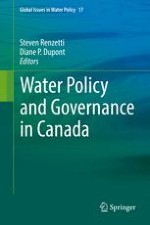2017 | OriginalPaper | Buchkapitel
22. Shifting Perspectives in an Era of Complexity and Change: Incorporating Resilience into the Water Governance of Canadian Drainage Basins
verfasst von : Ryan Plummer, Julia Baird, Katrina Krievins, Jennifer Fresque-Baxter, Jack Imhof, Simon J. Mitchell
Erschienen in: Water Policy and Governance in Canada
Aktivieren Sie unsere intelligente Suche, um passende Fachinhalte oder Patente zu finden.
Wählen Sie Textabschnitte aus um mit Künstlicher Intelligenz passenden Patente zu finden. powered by
Markieren Sie Textabschnitte, um KI-gestützt weitere passende Inhalte zu finden. powered by
